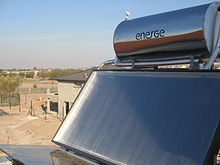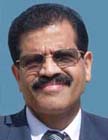|
| |
Tips & guidelines: Solar
water heater
Main
Article page |
Beauty articles
|
Health page |
Computers|
Diseases |
Education |
Entertainment |
Family
Business |Fitness|
Fruits and Vegetables
|
Jobs |
General |
Personality|
Technology
|
Tourism |
Sports
House Plans |
House Loans |
Real Estate|
Vaasthu
Shastra|
Construction Tips
Engineering page
| Interior Design |
Property Buying Tips |
Renting Tips |
Journals /
Magazines
Education | List of Colleges |
Entrance

What is Solar Water Heater?
Ans. A Solar Water Heater is a device which provides hot water for bathing,
washing, cleaning, etc. using solar energy. It is generally installed at the
terrace or where sunlight is available and heats water during day time which is
stored in an insulated storage tank for use when required including mornings.
How does it work?
Ans. A Solar Water Heater comprises of a or an array of solar collectors to
collect solar energy and an insulated tank to store hot water. Both are
connected to each other. During the day time, water in solar collectors gets
heated which is either pumped or flown automatically on thermosyphon principle
to the storage tank. Hot water then stored in the tank can be used for various
applications.
What are different types of Solar Water Heaters?
Ans. Two types of Solar Water Heaters are available; one based on flat plate
collectors and the other based on evacuated tube collectors. Flat plate
collector (FPC) based systems are of metallic type and have longer life as
compared to Evacuated tube collector (ETC) based system because ETCs are made of
glass which are of fragile in nature.
Both these systems are available with and without heat exchanger. They can also
work with and without pump. Systems without pump are known as thermosyphon
systems and those with pump are known as forced circulation systems.
Which type of solar water heater is suitable for different places/ category
of users?
Ans. ETC based systems are cheaper than FPC based system. They perform
better in colder regions and avoid freezing problem during sub-zero temperature.
FPC based systems also perform good with anti-freeze solution at sub zero
temperature but their cost increases. In other regions, both perform equally
good.
Systems working on thermosyphon principle are simple and relatively inexpensive.
They are suitable for domestic and small institutional applications, provided
water quality is good and it doesn’t have large chlorine contents. Forced
circulation systems are generally preferred in industries or large
establishments.
At places where water is hard and have larger chlorine content, if FPC based
system is being installed, it must be with heat exchanger as it will avoid scale
deposition in copper tubes of solar collectors which can block the flow of water
as well reduce its thermal performance. ETC based systems will not block the
flow of water but its performance may go down due to deposition of salt contents
on inner surface of glass tubes, which could be cleaned easily once in a year or
so.
What is the approximate cost of solar water heater?
Ans. Cost of solar water heater depends on size and type of system
installed. Smallest size of a system is 100 liter per day, which means that it
can deliver 100 lietrs of hot water in a day at 60 C. A 100 lpd capacity system
is sufficient for a family of 3-4 members and it may cost Rs. 15,000 to
Rs.22,000 in planes depending on the type of system. In hilly & N-E region, the
cost may be 15 to 20% more.
The system cost does not include the cost of cold water tank, & its stand which
is required if overhead tank is not installed in a house/ building. Cost of hot
water insulated pipe line also, may be extra if number of bathrooms is more than
one. Additional cost towards all these components may increase by 5 to 10%.
The cost, however, does not increase linearly with increase in capacity, rather
it comes down proportionately as we go for higher capacity system.
Is there any subsidy available from Government?
Ans. Yes, the Government provides subsidy to the extent of 30 to 60% to
different category of users and States subject to certain benchmarks as per
below:
General category states for all types of beneficiaries: 30% capital subsidy
orloan at 5% interest on 80% of the benchmark cost
Special category states for domestic & non commercial categories (not availing
accelerated depreciation): 60% capital subsidy orloan at 5% interest on 80% of
the benchmark cost
Special category states for commercial users category (availing accelerated
depreciation): 30% capital subsidy or loan at 5% interest on 80% of the
benchmark cost
Benchmark Cost : ETC based systems : Rs. 10,000/ sq. m.
FPC based systems : Rs. 11,000/ sq. m.
Q. No. 7 How can I avail this subsidy & get the system installed at my place?
Ans. The system can be installed at net of subsidy by following ways:
Domestic Systems
Through State Nodal Agency- Contact respective state nodal agency in your
state ( list with phone no. given on MNRE website) who will visit the site,
provide information on cost, size & other details of system required and get it
installed at net of government subsidy through some manufacturers.
Through Accredited Channel Partners of MNRE (List available at MNRE website)-
Contact any of them and get the system directly installed from him at net of
subsidy.
Institutional Systems
Through State Nodal Agency- In same fashion as above by inviting tenders and
placing order to selected manufacturer
Through DGS&D rates- Details available on DGS&D website
Through Accredited Channel Partners- In same fashion as above
Why should I go for a Solar Water Heater? What do I save from it?
Ans. A 100 litre per day capacity system suitable for 3-4 people can save
upto 1500 units of electricity in a year, depending on hot water used. It can
also save around 140 litres of diesel in an establishment using oil fired boiler
besides reducing green house gas emissions in the atmosphere. Higher capacity
systems will save higher amount of electricity/fuel oil besides reducing higher
amount of GHG emissions.
Electricity is expensive and is not available due to power cuts in many areas
when required for heating water. Solar Water Heater, since it stores hot water
in an insulated tank, provides water all the time when required. Fuel oil is
also expensive and creates pollution.
What happens on cloudy/rainy day? Do I still get hot water?
Ans. On cloudy days also, if it is for a day or two, you still get warm
water as water gets heated due to diffused radiation available in the
atmosphere. The system, however, is either connected to an electric geyser in
the house or an electrical back-up is provided in the storage tank of the system
which is switched on when water is not sufficiently hot. So, you get hot water
all the time even on rainy days.
How do I decide about the size/capacity of the system to be installed?
Ans. For a house with one bathroom and 3 to 4 members, 100 liter per day
capacity system should be sufficient. For more numbers of bathrooms, the
capacity will increase accordingly due to pipe losses & more number of family
members. Generally the capacity is decided based on hot water required in
mornings for bathing. If the usage is in evening & at other times also, the
capacity is decided accordingly. Some useful thumb rules for estimating the hot
water requirement are given below:
Application
Typical Requirement of Hot Water at 60OC.
Household bathing using buckets
10-20 liters per person per bath.
Household bathing using shower with a mixing tap
20-30 liters for 10-15 minute bath
Shaving, while a tap runs
7-10 liters
Household bathing in bathtub (one filling)
50-75 liters
Wash basin with a mixing tap (hand wash, brushing of teeth, etc.)
3-5 liters per person per day.
Kitchen washing
2-3 liters per person per day.
Dishwasher
40-50 liters per wash cycle
Clothes washing machine
40-50 liters per cycle
How do I assure that a good quality system is installed at my house?
Ans. Ministry has laid down some minimum technical requirements for installation
of solar water heating systems in the field. These have been made mandatory for
manufacturers and suppliers and are available on MNRE website: www.mnre.gov.in.
These requirements are have been prepared in such a way that even a lay man can
also check them and ensure that those are being adhered to by the
manufacturers/suppliers. In case any manufacturer/supplier is found not sticking
to these requirements, he may be blacklisted if informed to the Ministry.
Are there any maintenance requirements?
Domestic solar water heating system do not need significant maintenance
requirements. Occasional leakages in the plumbing could be easily repaired by
common plumbers. In case quality of water is hard, scale deposition in the
collectors may result over the years. This may require de-scaling with acids for
which it is best to contact the suppliers. Broken glass may also have to be
replaced by the suppliers. If outside exposed surfaces are painted, the paint
may have to be redone every 2-3 years to prevent corrosion of the surfaces. (
Courtesy: http://mnre.gov.in/ )
For
more information
More..
Articles:
-
Tips & guidelines: Electricity Saving at home
-
Coming Up With Landscaping Ideas
-
How to set out a building on site
-
What
is
Green Building ?
-
What is Domestic biogas plant ?
-
Why home insurance is very important in India?
-
How To Install a Home Wind Turbine
to get energy
-
How to Install Electric Wiring
-
Significance of Home Plumbing
-
Should I buy or rent? A simple calculation
-
Easy Landscaping Tips for Beginners
-
Construction technique:
Rapidwall technology
-
Buying a flat? Don't get carried away by the sample
-
30-storey hotel built in just 15
days
-
Is it worth buying an old
house
-
House plans, home plans, plans, residential plans
-
House Loans, home loans, where to get housing loan
-
How do loans work, the basic concepts of loans
-
Construction Tips, construction guide lines,
-
house rental tips, rental tips, renting properties
-
Real Estate
-
Flooring
-
What is Reverse Mortgage
-
Guidelines to purchase residential properties
-
Lotus-shaped 91 feet prayer hall in kerala
-
What is Interior Design, interior desings, resources
-
Interior Design Colleges
-
Interior Design- Bed Rooms
-
Interior Design- Bath Rooms
-
Kitchen Designs, kitchens
-
Modern Architectural Design Softwares
-
Landscaping Designs landscape architectures
-
-
|
|
| |
|



